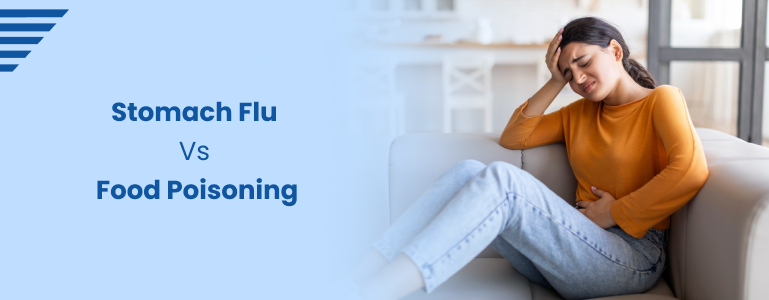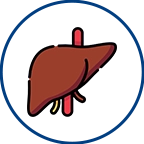Stomach Flu vs Food Poisoning: How to Tell the Difference

We've all been there – the sudden onset of nausea, vomiting, diarrhea, and abdominal pain that leaves you feeling miserable and desperately searching for the cause. Two common culprits for these symptoms are stomach flu (gastroenteritis) and food poisoning. While the symptoms may seem similar, these two conditions have different causes and require distinct approaches for treatment and prevention. In this blog, we'll explore the differences between stomach flu and food poisoning and provide insights on how to identify each.
Stomach Flu (Gastroenteritis):
What Is It?
Stomach flu, medically known as gastroenteritis, is an inflammation of the stomach and intestines. It is typically caused by viral infections, most commonly norovirus or rotavirus, although other viruses can also be responsible.Similar symptoms can also result from bacterial and parasite illnesses, however viruses are typically to blame.
Home Sample Collection
Symptoms:
Nausea and vomiting
Diarrhea
Abdominal cramps or pain
Low-grade fever
Muscle aches
General fatigue and weakness
Onset Time: SAfter being exposed to the virus, stomach flu symptoms often start to manifest one to three days later and can linger for up to a week.
How It Spreads: The highly contagious stomach flu virus can be transferred by direct contact with an infected person, tainted food or water, or simply touching surfaces.
Treatment: Treatment primarily focuses on relieving symptoms and preventing dehydration. This includes staying hydrated with clear fluids, resting, and avoiding solid foods until symptoms improve. Over-the-counter medications can help manage nausea and diarrhea, but they should be used with caution, especially in children.
Prevention: The transmission of stomach flu can be stopped by using appropriate hygiene practices, such as frequent handwashing and avoiding close contact with infected people.
There are vaccines available for some viral gastroenteritis causes, such as rotavirus.
Food Poisoning:
What Is It?
When you consume infected food or drinks, you develop food poisoning, sometimes referred to as a foodborne sickness. Food poisoning can be caused by bacteria, parasites, viruses, or the toxins these microbes generate.
Symptoms:
Nausea and vomiting
Diarrhea
Abdominal pain and cramps
Fever
Muscle aches
Headaches
Onset Time: The onset of food poisoning symptoms can vary widely depending on the cause. Some symptoms may develop within hours, while others may take days to appear.
How It Spreads: Food poisoning is typically caused by consuming contaminated food or beverages. It can also spread from person to person if proper hygiene measures are not followed after handling contaminated items.
Treatment: Treatment for food poisoning mainly focuses on relieving symptoms and rehydrating the body. In severe cases, especially when there is a risk of dehydration, hospitalization may be necessary. If a bacterial infection is the root of the problem, antibiotics may be recommended.
Prevention: Preventing food poisoning involves safe food handling practices, such as cooking meat thoroughly, refrigerating leftovers promptly, and avoiding raw or undercooked eggs and seafood. Practicing good hand hygiene and maintaining a clean kitchen environment are also essential for preventing foodborne illnesses.
Distinguishing Between the Two:
While food poisoning and the stomach flu have many similar symptoms, there are several important distinctions that might help you tell them apart. the two:
Onset time: Stomach flu symptoms usually have a more predictable onset within a few days of exposure, whereas food poisoning symptoms can vary widely and may appear shortly after eating contaminated food or take several days to manifest.
Fever: A fever is more commonly associated with food poisoning, particularly if it is caused by bacteria. Viral gastroenteritis (stomach flu) can also cause a low-grade fever but is less likely to result in high fever.
Duration: Stomach flu symptoms often resolve within a week, while the duration of food poisoning symptoms can vary depending on the specific microorganism responsible.
Source of exposure: Consider whether others who ate the same food are experiencing similar symptoms. If so, it may be food poisoning. If you've been in close contact with someone who is also ill, it could be stomach flu.
Conclusion
while stomach flu and food poisoning share similar symptoms, they have different causes and treatment approaches. If you suspect you or someone you know is experiencing one of these conditions, it's important to seek medical advice, especially if symptoms are severe or persist. Remember that both can often be prevented through proper hygiene and food safety practices, making prevention your first line of defense against these unpleasant illnesses.
Frequently Asked Questions
1: What is the primary cause of stomach flu and food poisoning?
Stomach flu (gastroenteritis) is primarily caused by viral infections, such as norovirus or rotavirus, although bacterial and parasitic infections can also be responsible.Contrarily, food poisoning is brought on by consuming tainted food or beverages that contain hazardous microorganisms (bacteria, parasites, or viruses) or the poisons these microorganisms generate.
2: What are the common symptoms of stomach flu and food poisoning?
Similar signs and symptoms, including as nausea, vomiting, diarrhea, stomach discomfort, and rarely fever, are usually present in both diseases. However, depending on the underlying cause and other conditions, the precise symptoms and their severity can change.
3: How quickly do symptoms appear after exposure to the causative agent?
Stomach flu symptoms typically appear within 1-3 days after exposure to the virus, while the onset of food poisoning symptoms can vary widely. Some food poisoning symptoms may develop within hours, while others may take days to manifest.
4: Is fever a reliable indicator to differentiate between the two conditions?
Fever can be present in both stomach flu and food poisoning. Food poisoning, especially when caused by bacteria, is more likely to result in a fever. Stomach flu can also cause a low-grade fever, but it is generally less likely to lead to a high fever.
5: How long do the symptoms of stomach flu and food poisoning typically last?
Stomach flu symptoms usually resolve within a week, although they can persist for a few days. The duration of food poisoning symptoms varies depending on the specific microorganism responsible. Some cases may resolve within a day or two, while others can last longer, even up to several weeks.
6: Can both stomach flu and food poisoning be prevented?
Yes, both conditions can often be prevented through proper hygiene and food safety practices. For stomach flu, practicing good hand hygiene and avoiding close contact with infected individuals are crucial. For food poisoning, safe food handling practices, such as cooking meat thoroughly, refrigerating leftovers promptly, and avoiding raw or undercooked eggs and seafood, are essential preventive measures.
7: When should I seek medical attention for these conditions?
If you or someone you know has severe or lingering symptoms, dehydration symptoms (such as dry mouth, dark urine, or lightheadedness), or if there is blood in the stool or vomit, it is imperative that you get medical help. People who are expecting, kids, the elderly, Immune-compromised individuals and pregnant women should take special precautions and consult a doctor as soon as possible.
8: Can over-the-counter medications help with the symptoms of stomach flu and food poisoning?
Over-the-counter medications can be used to manage certain symptoms, such as nausea and diarrhea, for both conditions. However, they should be used with caution and only as directed, especially in children, as they may not be suitable for everyone. It is best to speak with a doctor before using these medications, especially if the condition is severe.
Book Your Slot
Our Locations Near You in Hyderabad
3KM from Banjara Hills
1.9KM from Yusufguda
3KM from Madhura Nagar
5KM from Shaikpet
Profiles
- Cardiac Risk Profile
- Pituitary marker Profile
- Rheumatoid Arthritis Profile
- Dengue Fever Panel
- Lung Cancer Panel 1 Complete Molecular
- Gastroenteritis Screening Panel
- Thyroid Profile (T3,T4,TSH), Serum
- Pancreatic Marker Profile
- STD profile
- Androgen Profile
- Lipid Profile, Serum
- Pancreatic(acute)Profile
- PCOD Profile
Radiology
Pathology Tests
- Glucose Fasting (FBS),Sodium Fluoride Plasma
- Creatinine, Serum
- Glycosylated Hemoglobin (HbA1C)
- Vitamin B12 (Cyanocobalamin), Serum
- Thyroid Stimulating Hormone (TSH) Ultrasensitive, Serum
- Complete Urine Examination (CUE), Urine
- Liver Function Test (LFT),Serum
- Dengue (IgG & IgM), Serum
- Dengue Antigen (Ns1) Rapid, Serum
- C-Reactive Protein (CRP), Serum
- Widal (Slide Method), Serum
- Total IgE, Serum




